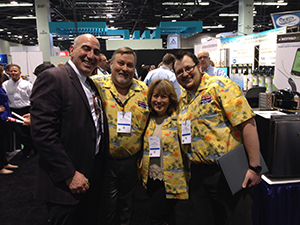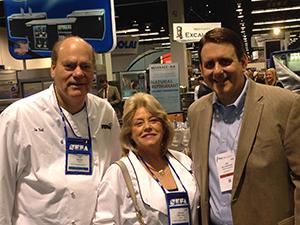While the recipe for value continues to evolve, in today's foodservice industry two ingredients remain constant: being knowledgeable and flexible, writes FE&S' Editorial Director Joe Carbonara.
Since February of this year, we've had the opportunity to attend a variety of events, including The NAFEM Show, RestaurantPoint and, most recently, the FEDA convention. If there's any one unofficial theme or concept that seems to tie these different events together it's not foodservice – it's the idea of value.
 Once again the Ace Mart team brightened The NAFEM Show floor with their festive apparel in 2015.Every segment of the foodservice industry today, starting with the operators and working all the way back through the supply chain through to consultants, equipment and supplies dealers, reps, service agents and even factories, is coming to understand what customers value the most today and how that will evolve tomorrow.
Once again the Ace Mart team brightened The NAFEM Show floor with their festive apparel in 2015.Every segment of the foodservice industry today, starting with the operators and working all the way back through the supply chain through to consultants, equipment and supplies dealers, reps, service agents and even factories, is coming to understand what customers value the most today and how that will evolve tomorrow.
For the operators, the value proposition was once pretty simple: provide a product – in this case a menu item – for a price. As the experience improved, so did the quality of the food and the price. Today consumers expect customizable, higher quality food options no matter the price point or location. And the experience matters as much if not more than the food product. The industry is rife with examples of concepts that eventually withered away because their service or the experience they provided did not meet customers' expectations.
This opens lots of opportunities for operators to become even more creative than before with respect to how they execute the menu and serve customers. The point is that value may be a ubiquitous term, its definition remains anything but.
That's why operators continue to invest heavily in studying customer behavior, trying new menu items, adding new concepts (usually fast casual) and why they have considerably shortened their restaurant design cycles. Many chain restaurant executives we met with at RestaurantPoint said their concepts now expect their new designs to last 3 to 5 years instead of the 10 to 20 years that used to be the norm.
Further, as restaurant operators invest in new designs and concepts, the speed at which they need to roll them out continues to accelerate. Many concepts reported testing their new designs at first and then really accelerating their plans, often doubling their rollouts in a short period of time. And these companies are doing this with staffs that shrunk during the recession.
So what does this mean for the other members of the supply chain? To me it comes down to being flexible and knowledgeable. Those are two attributes successful operators exhibit today as they strive to remain relevant in their customers' eyes. Operators should expect the same from their suppliers.
 Dressed for success: Jim Reid (left) and Tedde Reid (center) show off the chef’s coats the group of roughly 60 SEFA DSRs wore on The NAFEM Show floor with FE&S’ Joe Carbonara.For the operators we spoke with, doing more with less seems like a quaint notion. Their realities tend to be much more extreme. Start with the realization that a longstanding relationship with a customer may get a supplier in the door but it won't guarantee you a seat at the table. Listen to your customers' plans and look for ways, within your set of core competencies, to help alleviate some of the pressure they feel. Keep in mind it's not just what you do but how you do it that will make a difference. Be flexible in your approach because every client likes what they feel is a customized solution – one that provides value on their terms.
Dressed for success: Jim Reid (left) and Tedde Reid (center) show off the chef’s coats the group of roughly 60 SEFA DSRs wore on The NAFEM Show floor with FE&S’ Joe Carbonara.For the operators we spoke with, doing more with less seems like a quaint notion. Their realities tend to be much more extreme. Start with the realization that a longstanding relationship with a customer may get a supplier in the door but it won't guarantee you a seat at the table. Listen to your customers' plans and look for ways, within your set of core competencies, to help alleviate some of the pressure they feel. Keep in mind it's not just what you do but how you do it that will make a difference. Be flexible in your approach because every client likes what they feel is a customized solution – one that provides value on their terms.
Invest in continuing to educate your people. As the old saying goes, knowledge is power. This starts at the top and works its way through all corners of an organization. At The NAFEM Show it was impressive to see how many dealer sales reps that companies like TriMark USA and Ace Mart had working hard on the show floor.
Equally impressive, though, were the nearly 60 dealer sales reps from the various SEFA member companies that were in attendance at The NAFEM Show. These DSRs had to first clear a series of educational hurdles before they could hit the show floor in Anaheim to bolster the equipment and supplies-specific knowledge base. In talking with these DSRs during a special dinner on the eve of the show, what struck me was their anticipation about hitting the show floor running.
While grateful their buying group picked up the tab for their participation, this group of SEFA DSRs was even more excited to share their newly attained knowledge with their customers back home. See, that's the other thing that operators want from the supply chain: be their eyes and ears to the industry and proactively introduce new solutions to their business challenges. Undoubtedly, these DSRs returned home ready to do just that.
Indeed, being flexible and knowledgeable may seem simple enough but accomplishing both will be easier said than done in today's fast-paced foodservice industry.



